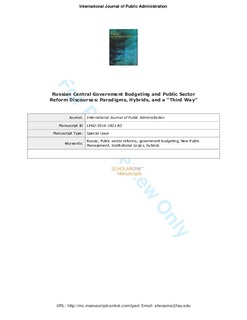Russian central government budgeting and public sector reform discourses : Paradigms, hybrids, and a “third way”
Journal article, Peer reviewed
Accepted version

View/
Date
2017Metadata
Show full item recordCollections
Original version
Khodachek, I. & Timoshenko, K.Y. (2017). Russian central government budgeting and public sector reform discourses: Paradigms, hybrids, and a “third way”. International Journal of Public Administration. doi: 10.1080/01900692.2017.1383417Abstract
This study explores how public sector reform discourses are reflected in Russian central government budgeting. Through the lenses of institutional logics, Russian central government budgeting is considered to be a social institution that is influenced by rivaling reform paradigms: Public Administration, New Public Management (NPM), the Neo-Weberian State, and New Public Governance. Although NPM has dominated the agenda during the last decade, all four have been presented in “talks” and “decisions” regarding government budgeting. The empirical evidence illustrates that the implementation of management accounting techniques in the Russian public sector has coincided with and contradicted the construction of the Russian version of bureaucratic governance, which is referred to as the vertical of power. Having been accompanied by participatory mechanisms and a re-evaluation of the Soviet legacy, the reforms have created prerequisites for various outcomes at the level of budgeting practices: conflicts, as in the UK, and hybridization, as in Finland.